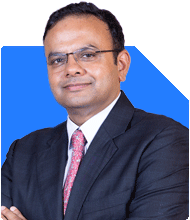Saving 1 crore in 10 years: Can I achieve this with my current 10k SIP?
Ramalingam Kalirajan |10902 Answers |Ask -Follow
Mutual Funds, Financial Planning Expert - Answered on Jan 23, 2025
He has an MBA in finance from the University of Madras and is a certified financial planner.
He is the director and chief financial planner at Holistic Investment, a Chennai-based firm that offers financial planning and wealth management advice.... more
.jpg)
I want to create a corpus of 1 cr in next 10 years. I am doing a sip of 10k from last 5 years. What should i do and how much should i save now monthly and in what options?
Understanding Your Current SIP Contributions
Current Progress
Your existing SIPs have built a decent corpus over 5 years.
Equity mutual funds provide growth, especially if the portfolio is well-diversified.
Impact of Time
Compounding needs both time and sufficient contributions.
To achieve Rs. 1 crore in 10 years, you’ll need to increase your SIP contributions.
How Much to Save Monthly
Additional SIP Contributions Needed
Review your target and adjust your SIP contributions.
Based on current market trends, increasing SIP to Rs. 20,000-25,000 monthly could help.
This will ensure you stay on track to meet your goal in the next 10 years.
Investment Options to Consider
Actively Managed Equity Mutual Funds
Actively managed funds offer better growth potential than index funds.
Fund managers help optimise returns by navigating market opportunities.
Diversify across large-cap, mid-cap, and small-cap funds for balanced growth.
Avoid Index Funds for Higher Returns
Index funds follow the market and may not outperform actively managed funds.
Actively managed funds provide a better opportunity for long-term wealth creation.
Hybrid Funds for Stability
Hybrid funds balance equity and debt exposure, reducing volatility.
Allocate a small portion to hybrid funds to stabilise the portfolio.
Systematic Investments Over Lump Sums
Continue SIPs as they help average out market volatility.
Avoid lump-sum investments unless the market shows a significant correction.
Tax-Efficient Investing
Minimise Tax Liabilities
Equity mutual funds offer better post-tax returns compared to debt funds.
Long-term capital gains (LTCG) tax of 12.5% applies only if gains exceed Rs. 1.25 lakh.
Avoid Frequent Redemptions
Keep investments for the long term to minimise short-term capital gains tax of 20%.
Regularly Review Your Investments
Monitor Portfolio Performance
Review your mutual fund portfolio annually.
Ensure funds are consistently outperforming their benchmarks.
Rebalance Periodically
Adjust equity and debt allocations as needed.
Maintain a higher equity allocation for the next 6-8 years, reducing it closer to the goal.
Emergency Fund and Insurance
Maintain an Emergency Fund
Ensure you have 6-12 months of expenses in liquid assets.
This protects your investments during unforeseen financial needs.
Adequate Insurance Coverage
Review your term insurance to ensure it matches your financial responsibilities.
Consider health insurance coverage to avoid medical emergencies impacting investments.
Avoid Common Pitfalls
Avoid Direct Mutual Funds
Direct funds lack personalised guidance.
Invest through a Certified Financial Planner (CFP) who can provide tailored advice.
Stay Consistent
Avoid stopping SIPs during market downturns.
SIPs benefit from market corrections by purchasing more units at lower prices.
Don’t Time the Market
Focus on long-term growth rather than trying to predict short-term market movements.
Final Insights
Reaching Rs. 1 crore in 10 years is achievable with disciplined savings and smart investments. Increase your SIP contributions to Rs. 20,000-25,000 monthly, focusing on actively managed funds. Review your portfolio regularly, rebalance when needed, and maintain financial safeguards like an emergency fund and insurance. These steps will ensure you meet your goal confidently and efficiently.
Best Regards,
K. Ramalingam, MBA, CFP,
Chief Financial Planner,
www.holisticinvestment.in
https://www.youtube.com/@HolisticInvestment
You may like to see similar questions and answers below
Omkeshwar Singh | Answer |Ask -Follow
Head, Rank MF - Answered on Dec 06, 2022
Abhishek Dev | Answer |Ask -Follow
Financial Planner - Answered on Aug 02, 2023
Ramalingam Kalirajan |10902 Answers |Ask -Follow
Mutual Funds, Financial Planning Expert - Answered on May 29, 2024
Ramalingam Kalirajan |10902 Answers |Ask -Follow
Mutual Funds, Financial Planning Expert - Answered on Aug 07, 2024
Anu Krishna |1749 Answers |Ask -Follow
Relationships Expert, Mind Coach - Answered on Dec 17, 2025
Anu Krishna |1749 Answers |Ask -Follow
Relationships Expert, Mind Coach - Answered on Dec 17, 2025
Radheshyam Zanwar |6748 Answers |Ask -Follow
MHT-CET, IIT-JEE, NEET-UG Expert - Answered on Dec 17, 2025
Anu Krishna |1749 Answers |Ask -Follow
Relationships Expert, Mind Coach - Answered on Dec 17, 2025
Dr Shakeeb Ahmed Khan |184 Answers |Ask -Follow
Physiotherapist - Answered on Dec 17, 2025
T S Khurana |538 Answers |Ask -Follow
Tax Expert - Answered on Dec 17, 2025
T S Khurana |538 Answers |Ask -Follow
Tax Expert - Answered on Dec 17, 2025
Janak Patel |72 Answers |Ask -Follow
MF, PF Expert - Answered on Dec 17, 2025
Ramalingam Kalirajan |10902 Answers |Ask -Follow
Mutual Funds, Financial Planning Expert - Answered on Dec 17, 2025
Samraat Jadhav |2511 Answers |Ask -Follow
Stock Market Expert - Answered on Dec 17, 2025






























